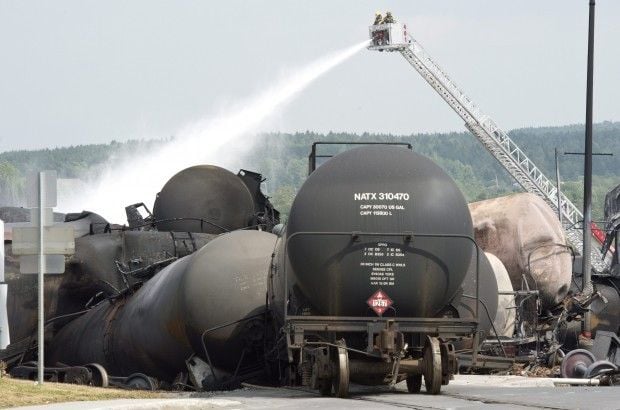WASHINGTON -- The Obama administration has delayed by nearly a year a plan to boost safety standards for the type of rail car that blew up in Canada earlier this month, killing at least 47 people.
Officials began work on the rule more than a year before the oil train derailed and exploded in Quebec on July 6, but the rule was never put in place. The proposal by the Pipeline and Hazardous Materials Safety Administration is intended to fix a dangerous design flaw in a rail car commonly used to haul oil and ethanol from coast to coast.
The soda-can shaped car, known as the DOT-111, has come under scrutiny from safety experts because of its tendency to split open during derailments and other major accidents.
That's what happened when an unattended Montreal, Maine & Atlantic Railway train came loose, hurtling down a 7-mile incline before derailing and igniting in Lac-Megantic, near the Maine border.
All but one of its 73 cars were carrying crude oil, and at least five exploded, setting off massive blasts that devastated the small lakeside town of 6,000 people.
Transportation experts say the car's design makes it prone to damage and catastrophic loss of hazardous materials.
A proposed rule to beef up rail-car safety had been scheduled to be put in place in October 2012, but it has been delayed until late September at the earliest. A final rule isn't expected until next year.
The pipeline safety agency said in a report this month that the latest delay was needed to allow "additional coordination" among officials and interested groups, including industry representatives who have resisted calls to retrofit existing cars, citing the expense and technical challenges such a requirement would pose.
In the first half of this year, U.S. railroads moved 178,000 carloads of crude oil. That's twice the number during the same period last year and 33 times more than during the same period in 2009.
The dominant railroads in Nebraska and the western United States -- Union Pacific and BNSF Railway -- do not comment on the routes they use for hazardous materials, such as oil and ethanol, but railroad employees acknowledge privately there are hundreds of loaded tank cars passing through Lincoln and southeast Nebraska every day. The railroads don't own the cars. The shippers do.
The DOT-111 tank car represents more than two-thirds of the U.S. rail fleet carrying crude oil.
The Associated Press reviewed 20 years of federal rail accident data involving DOT-111 cars used to haul ethanol and found the cars had been breached in at least 40 serious accidents since 2000. In the previous decade, there were just two breaches.
A spokeswoman for the American Association of Railroads, which represents the rail industry, said the group agreed with those in Congress who want the cars to be made safer.
"If safer and better DOT-111s can be had, then it makes good sense to ensure that the design and standards that these cars are built to must be tougher than the federal standards that exist today," said spokeswoman Patricia Reilly.
Rather than waiting for the Obama administration to act, Reilly said, the industry adopted voluntary standards ensuring that all DOT-111s ordered after October 2011 met tough requirements recommended by the NTSB after a deadly ethanol train derailment and explosion in Illinois in 2009.
But those voluntary standards do not apply to an estimated 40,000 cars built before October 2011.
The railroads and the oil industry have resisted calls to retrofit existing cars, saying that would present technological and engineering challenges and cost at least $1 billion.
The National Transportation Safety Board cited the car's "inadequate design" in the 2009 crash outside Rockford, Ill., that killed a woman and injured 11 others. The NTSB called for redesign or replacement of the DOT-111 cars, but a decision on whether to require a redesign is up to the pipeline safety administration, part of the U.S. Department of Transportation.
The DOT-111 car's steel shell is too thin to resist puncture in accidents, the NTSB said, and the ends of the car are vulnerable to ruptures. Valves used for unloading and other exposed fittings on the tops of the tankers also can break during rollovers.
The flaws were noted as far back as a 1991 safety study.
http://journalstar.com/ap/business/train-tank-cars-safety-rule-delayed/article_4a4965ee-29fd-56ed-b36d-b423856d09ef.html#.UffWBabNiyA.facebook

No comments:
Post a Comment